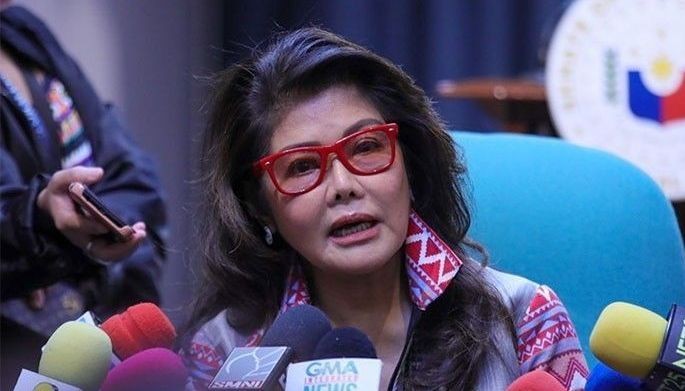Sen. Imee Marcos was trying to sell the Masagana 99, a pet project of her father, the late dictator. She claimed that it was successful as she urged the government to muster a program like it to assist farmers. One of the resource persons in that Senate hearing was then Secretary of Finance Carlos Dominguez who couldn’t resist giving the senadora a history lesson.
“Ma’am, before we go ahead, you mentioned Masagana 99. I was the Secretary of Agriculture that cleaned up the mess that was left by Masagana 99,” Dominguez said. “There were about 800 rural banks that were bankrupted by that program. We had to rescue them. So, whether it’s a total success or not, it has to be measured against that,” he added.
The senadora replied that Masagana 99 did not benefit the banks but it sure did facilitate Philippine rice exports. Secretary Dominguez debunked this too: “We never exported, Ma’am.”
Masagana 99 was a failure. In a 2012 study, researchers at PIDS, the state-funded think tank, noted how Masagana 99 failed to uplift the still-struggling farm sector while also leaving poor farmers highly indebted. Their failure to repay loans also tarnished the balance sheets of many rural banks.
Well, on his 67th birthday, President Marcos unveiled the Agri-Puhunan at Pantawid (APP) program to increase the rice yield in 1.2 million hectares. With an initial funding of P3 billion from the DBP, APP targets increasing farmers’ productivity and income by providing them low-cost credit, financial assistance and a ready market for farmers’ harvests in areas near major irrigation systems like Upper Pampanga, Magat and the Cordillera.
A farmer with one hectare of rice land will receive P58,000, covering production costs – inputs, land preparation, hauling, including a subsistence allowance of P32,000 which will be given P8,000 monthly for four months, with crop insurance cover. The APP proceeds will complement government subsidies for inputs, services and insurance totaling P14,500 per hectare.
Per DA estimates, an APP farmer could net P65,000 per cropping, based on five tons per hectare yield and after repaying the loan, interest and taxes. The amount includes a P32,000 subsistence allowance.
The National Food Authority guarantees to buy the farmer’s harvest. The farmer can sell his surplus harvest to other buyers.
Agriculture Secretary Francis Tiu Laurel explains that “The APP is contract farming. It guarantees a decent higher income to the farmers while providing the government a stable supply of our staple food. It could reduce rice imports.”
The initiative, Tiu Laurel hopes, “will finally unlock the potential of agriculture which provides two out of every ten jobs in the Philippines but contributes less than ten percent to the gross domestic product. This will be a game changer.”
Key to the success of the program is the provision of credit to the farmers. That was also the idea behind Masagana 99. The problem, however, is that farmers consider anything coming from the government as a dole out and does not require repayment. Perhaps this is what DBP will now test by allocating an amount it can afford to lose. For context, P3 billion should be money well spent compared to the P5.6 billion in DepEd food wastage cited by COA.
A worthwhile aim of the program is to break the financial hold of traders on farmers at the root of rural poverty and out of control rice retail prices. According to the DA and the DBP, this new program will provide a combination of low-interest loans and subsistence allowances to qualified farmers. The program aims to uplift the living conditions of farmers.
Traders have long been a key player in our agricultural sector. Their relationship with the farmers is not limited to buying their produce. Traders also provide loans to the farmers with the unwritten agreement that they will sell their produce to the traders at a dictated price. This practice has been going on for generations, keeping the farmers at subsistence level.
But farmers prefer borrowing from the traders rather than from banks. Traders don’t require voluminous documents to fill out in applying for a loan. The traders also provide consumption loans, or cash to buy cell phones, for funeral expenses, for weddings, etc. Farmers end up being heavily in debt with the traders who control and manipulate the buying price of the farmers’ produce.
Hopefully, the government has learned the lessons of Masagana 99 although this is doubtful. Lessons have likely been forgotten because that was so long ago. As Senator Imee’s misguided recollection showed, it is a program heavy with propaganda that covered up its utter failure.
The DA also has the tendency to launch half-baked programs that raise high expectations, only to sputter in the end. A recent reduction in imported rice tariff to reduce retail prices of rice seems to have failed as traders are keeping imported rice at ports rather than releasing it to the market.
According to the Federation of Free Farmers, rice traders pocketed over P5 billion in extra profits in less than three months instead of passing on savings from lower tariff to consumers.
FFF also expressed alarm that palay prices are declining as the harvest season starts. FFF thinks local traders are hedging against an oversupply in the coming months due to the continued arrival of cheap rice imports and the inflow of fresh harvests from the provinces.
With the APP, it is hoped the DA officials know what they are doing and are up to the challenge. Trying to remove the traders from the equation is a very worthy objective but it will not be easy. The traders have been on the ground longer and they can run circles around the DA technocrats who are no match to their cunning ways.
Everything looks good on paper. Hopefully this time with APP, the outcome will be sweeter than Masagana 99.
Boo Chanco’s email address is bchanco@gmail.com. Follow him on X @boochanco


